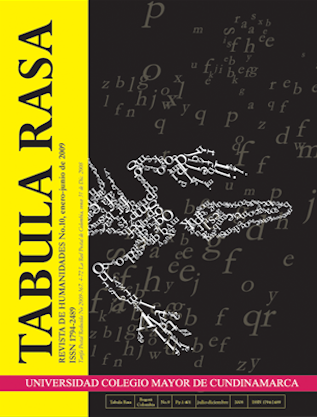Is social progression achievable when one from ten leaves naught?
¿Es factible el progreso social cuando diez menos uno es igual a cero?
Show authors biography
This paper discusses the opinions of sixteen Caribbean scholars on social progression, and concludes that such a thing is really unattainable in the Caribbean, where metanarratives decimate masses and keep a few elites’ power position. Under this light, an important step towards social advance in the Caribbean would be the evisceration of entrenched European meta-narratives.
Article visits 144 | PDF visits 45
Downloads
Alpert, Harry. 1939. Emile Durkheim and His Sociology. Nueva York: Columbia University Press.
Altbach, Phillip. 2007. “The Imperial Tongue: English as the Dominating Academic Language”. International Higher Education. No. 49, Otoño.
Bernal, Martin. 2006. Black Athena: The Afroasiatic Roots of Classical Civilization. Rutgers University Press.
Braithwaite, Lloyd. 1953. “Social Stratification in Trinidad: A preliminary Analysis”. Social And Economic Studies 2. Nos. 2 &3 (Octubre).
Cooley, Charles Horton. 1926. “The Roots of Social Knowledge”. Amer. F. Social., vol. 32 (julio, 1926), pp. 59-79.
Chevannes, Barry. 2007. Betwix and Between. Kingston, Jamaica: Ian Randall Press.
Dupuy, Alex. 2001. “The New World Order, Globalization and Caribbean Politics. Meeks, Brian, Folke Lindahl New Caribbean Thought: A Reader. Kingston, Jamaica: University of the West Indies Press.
Figuerra, Darius. 2004. “Exiting a Racist Worldview. A Journey through Marx, Said and Foucault to Liberation”.
Graham, Otis. 1999. Our Kind of People: Inside America’s Black Upper Class. Nueva York: Harper Collins.
Henry Paget. 2000. Caliban’s Reason. Nueva York: Routledge Press.
Hoffheimer, Michael. 2005. “Race and Law in Hegel’s Philosophy of Religion”. Andrew Valls (ed.) Race and Racism in Modern Philosophy, Ithaca, Nueva York. Cornell University Press.
Lee Freese y Jane Sell. 1980. “Constructing Axiomatic Theories in Sociology”, Part I: 263-310. En: Lee Freese (ed.). Theoretical Methods in Sociology: Seven Essays, Pittsburgh: The University of Pittsburgh Press, pp. 263-310.
Lewis, Linden. 2001. “The Contestation of Race in Barbadian Society and the Camouflage of Conservatism”. En: Meeks, Brian, Folke Lindahl (editors). New Caribbean Thought: A Reader. Kingston, Jamaica: University of the West Indies Press.
Lee Freese y Jane Sell. 1980. “Constructing Axiomatic Theories in Sociology”, Part II. En: Lee Freese (ed.). Theoretical Methods in Sociology: Seven Essays, Pittsburgh: The University of Pittsburgh Press, pp. 310-368.
Miller. Michael. 2007. Reshaping the Contextual Vision in Caribbean Theology: Theoretical Foundations for Theology which is Contextual, Pluralistic, and Dialectical. MD: University Press of America.
Mead, George. 1938. The Philosophy of the Act (ed.) Charles W. Morris. Chicago: The University of Chicago Press.
Mbiti, John N. 1970. African Religions and Philosophy. Nueva York: Doubleday.
Merton, Robert, K. 1967. “Sociology as Multi-paradigmatic”. En: On Theoretical Sociology. Nueva York: Free Press.
Mills, Charles. 1997. The Racial Contract. Ithaca: Cornell Press.
Mills, Charles. 1998. “Dark Ontologies: Blacks, Jews, and White Supremacy”. En: Jane Kneller y Sidney Axinn (eds). Kant and Contemporary Social Issues Albany: University of New York Press, Nueva York.
Mills, Charles. 2001. “Revisionist Ontologies: Theorizing White Supremacy”. Meeks, Brian, Folke Lindahl New Caribbean Thought: A Reader. Kingston, Jamaica: University of the West Indies Press.
Mills, C, Wright. 1956. The Power Elites. New York Oxford University Press.
Moskos, Charles C. Jr. y Wendell Bell. 1964. “emergent Caribbean nations Face the Emergent Caribbean Nations Face the Outside World.” Social Problems, Vol. 12, No. 1, (Verano, 1964), pp. 24-41.
Nettleford Rex. 1993. Inward stretching, Outward Reaching: A Voice From The Caribbean. Londres: Macmillan Caribbean.
Olwig, Karen Fog. 1993. Global Culture Island Identity: Continuity and Change in the AfroCaribbean Community of Nevis. Philadelphia, PA: Harwood Academic Publishers. hillips, Mike y Trevor Phillips. 1998. Windrush: The Irresistible Rise of Multi-Racial Britian. Londres, Inglaterra: Harper Collins Publishers.
Rose, Gillian. 1981. Hegel Contra Sociology. Londres: Athelone y Atlantic High-lands, NJ: Humanities.
Scott, David. 2001. “The Government and Freedom”. Meeks, Brian, Folke Lindahl New Caribbean Thought: A Reader. Kingston, Jamaica: University of the West Indies Press.
Peterson, Richard. 2005. “Marx, Race, and the Political Problem of Identity”. En: Andrew Valls (ed.). Race and Racism in Modern Philosophy. Ithaca, Nueva York: Cornell University Press.
Sankeralli, Burton. 2003. “Of Creoles and Creolization,” www.trinidad-tobago.net/Article.
aspx, 4 de mayo, 2003.
Simey, T.S. 1946. Welfare and Planning in the West Indies. Clarendon Press: Oxford. Clarendon Press: Oxford.
Van Den Berghe, Pierre. 1978. Race and Racism. Nueva York: Wiley.
Walcott, Dereck. 1992. “The sight of History”. The New York Times. 8 de diciembre, 1992.
Wynter, Sylvia. 1996. “Is Development a Purely Empirical Concept or Also Teleo logical”. En A. Y. Yansane (ed.). The Prospects For Recovery and Sustainable Development in Africa. West Port Connecticut: Greenwood Press.




